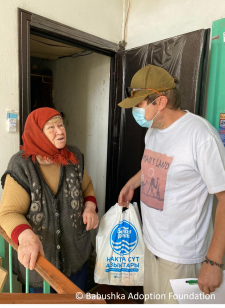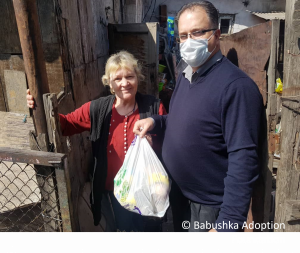
 In many contexts, volunteers have been critical for continuing social service delivery throughout the pandemic. Volunteers have increasingly been engaged to match the greater number of individuals and families in need, especially when funding constraints have prevented recruitment of more paid staff. They have also been an important way of reaching the most remote or marginalized communities, when restrictions on movement have prevented professional social service workers from doing so.
In many contexts, volunteers have been critical for continuing social service delivery throughout the pandemic. Volunteers have increasingly been engaged to match the greater number of individuals and families in need, especially when funding constraints have prevented recruitment of more paid staff. They have also been an important way of reaching the most remote or marginalized communities, when restrictions on movement have prevented professional social service workers from doing so.
Babushka Adoption Foundation works to alleviate poverty and loneliness for older people in Kyrgyzstan. Their beneficiaries live alone and receive pensions of less than about $74 a month. Babushka Adoption provides in-kind support, self-help groups and home care help, as well as the opportunity for individual sponsors to “adopt” a babushka or dedushka (literally, grandmother or grandfather) by providing personal connection and financial aid.
When the government implemented a national lockdown in response to COVID-19, transportation became extremely restricted, with driving privileges limited to police and doctors. This created an immense barrier to Babushka Adoption’s work, as staff could no longer deliver services, including cash, to beneficiaries. To adapt, the organization recruited volunteers via social media and, after assessing the needs of each beneficiary, shared that information with the newly expanded network. These volunteers brought food, financial aid and medical supplies to beneficiaries within 1.5 kilometres of their location, thus creating a more localized delivery method that could work despite the transportation limitations of the lockdown.
Recognizing the impacts of the pandemic, including social isolation, particularly on older individuals living alone, Babushka Adoption also provided psychological counselling over the phone to 280 elderly people, including some who had not previously been beneficiaries of their service. The organization recruited volunteer psychologists from local universities to help meet this growing demand.
Babushka Adoption has recognized the immense contribution of its volunteer network, including local students, and has systematized its process of working with volunteers to make it more sustainable. They developed a new written code outlining the responsibility of all volunteers, as well as the organization’s responsibilities to them, including training and transportation support outside of working hours. By formalizing the code in this way, Babushka Adoption hopes to create deeper ties to its volunteers to maintain relationships beyond the current crisis, provide guidance for their work and create a lasting volunteer system that can be used not only in the event of a future crisis, but to make the organization’s day-to-day work on behalf of elderly people more effective.
This case study and others can be found in our State of the Social Service Workforce Report 2020: Responding, Adapting and Innovating During COVID-19, and Beyond. Learn more about the role of volunteers during the pandemic and see how other organizations have adapted their service delivery.

